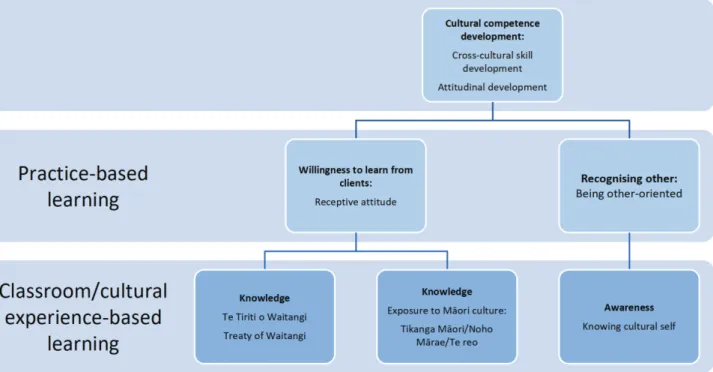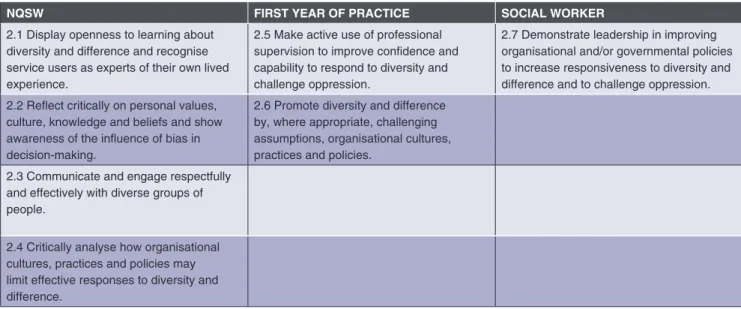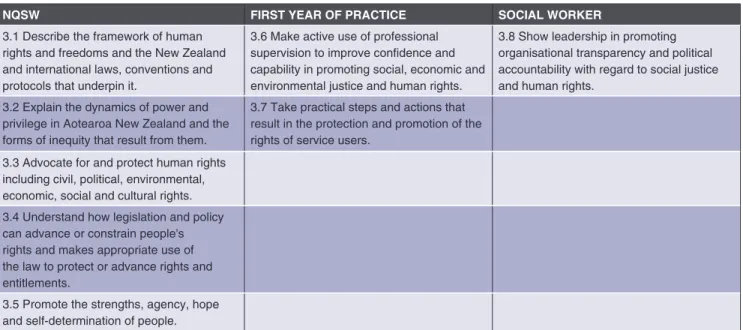The knowledge and skill base among social workers and other professionals working in the legal field with youth who have FASD has been neglected. Improving treatment and outcomes for youth with fetal alcohol spectrum disorder in the juvenile justice system: A social work-led response and practice framework.
ABSTRACT
Although many of the social workers participating in the NESP program are recent graduates, a number have also entered the mental health field from other fields. However, a structural strengthening of the role of social work within DHB mental health care is necessary to retain social workers in these settings.
Social work education in Aotearoa
New Zealand: A diffi cult journey for student caregivers
Recent research in Aotearoa New Zealand has drawn attention to the experiences of social work students, particularly during placement (Meadows et al., 2020; Raven et al., 2021). In Aotearoa New Zealand, a recent report on the wellbeing of social work and nursing students in Northland (Raven et al., 2021) described financial difficulties among students. In Aotearoa New Zealand, social work programs are accredited by the Social Workers Registration Board (SWRB), the regulatory body, and students are required to complete 120 days of field education in the final 2 years of their degree (SWRB, 2021b).
The wider study, entitled "The economic and social well-being of social work students in Aotearoa New Zealand New Zealand". Participants for the wider survey All Aotearoa New Zealand social work students were invited to participate in the online survey. Other studies have revealed the financial and other strains experienced by social work students in Aotearoa New Zealand (Meadows et al., 2020; Raven et al., 2021).
These are age, gender norms related to care and social work pedagogy. Critically, a review of the funding structure of social work education in Aotearoa is long overdue. Field placement and the impact of financial stress on social work and human service students.
Attitude or skills? Cultural competence development within an Aotearoa
New Zealand bicultural framework
Cultural competence is an essential part of learning for social work students to prepare them to face cross-cultural challenges in their future practice. There are various cultural competence models and frameworks that purport to guide the development of cultural competence. The primary criticism of cultural competence is the absence of a standard definition that has a uniform meaning.
In Aotearoa New Zealand, teaching biculturalism in social work education has become fundamental to cultural competence development (Beddoe, 2018; Eketone & . Walker, 2015; Fraser & Briggs, 2016). A primary goal of cultural competence is to analyze and assess exploitative power and privilege derived from a practitioner's cultural background and social context (Denso, 2018). Thus, this article discusses cultural competence based on how awareness and knowledge taught to research participants in Aotearoa New Zealand's social work programs is demonstrated in practice.
This study was designed to determine the effect of cultural competence: the components of awareness, knowledge and skills used in practice. From cultural competence to cultural awareness: Transitioning to a critical approach to work across differences in social work. Cultural competence in social work practice: Exploring the challenges of newly employed social work professionals.

Introducing a professional capabilities framework for social work in Aotearoa
The International Federation of Social Workers (IFSW) is widely regarded as the voice of the social work profession at global level and is recognized as such by the United Nations and the World Health Organization. The development of the standards was influenced by the IFSW (2014) definition of social work and the practice standards of the Aotearoa New Zealand Association of Social Workers (ANZASW, 2014). The Association of Social Workers (BASW, 2017) was the most complex and comprehensive of the frameworks examined.
The principles were included in the CCS as one of the outcomes of a wider review of social workers' competence to work with Māori, commissioned by the SWRB (SWRB, 2016) and carried out by Tangata Whenua Voices in Social Work. The EPAS framework requires social workers to advance human rights and social, economic and environmental justice. Competency one of the US EPAS document links ethics to professionalism, requiring social workers to demonstrate ethical and professional behavior.
The values prepared for the co-production workshops were well received with minor revisions to the descriptors and – in response to a proposal from several workshops – the inclusion of one additional value: Wairuatanga. NPF16-003-Enhancing-the-readiness-to-practice-of-newly-qualified-social-workers/LITERATURE-SCAN- Social-Work-Education-Curriculum-Mapping-and- Educational-Taxonomies.pdf. Enhancing the work readiness of newly qualified social workers in Aotearoa, New Zealand (Enhance R2P).

Mandatory reporting: ‘A policy without reason’
The centralized system currently in place requires reports to the legal arm of the system – the Oranga Tamariki (OT) – which come from a range of other professionals, family members and members of the public. For example, Ho et al. 2017) compared countries with and without universal mandatory reporting and found that the likelihood of confirming reports was significantly lower in mandated settings. In New South Wales (NSW), where mandatory reporting has been in place since 1977 (and referred to in the review as mandatory reporting . 'success'), there are a large number of reports, a low percentage of which are substantiated compared to non-reporting Western Australia (Ainsworth, 2002).
Mandatory reporting: a policy without reason. Reporting was initially proposed as a solution to child abuse, when Kempe assumed it was limited to those who had some sort of 'syndrome' or clear psychological disorder that caused them to abuse their children. The overall picture of a flood of reports, requiring a much larger number of social workers to process and assess them, combined with continued cuts to preventive services budgets, therefore points to a much bigger problem than mandatory reporting. Many of the situations people face in the community are rarely black and white.
Just three years ago, in response to the Hawkes Bay case, we submitted another case review, and five more reviews, all of which focused on reducing the chances of children entering care, more recognition of the potential for harm caused by caused by the system itself, and about reducing inequalities for Māori. But mandatory reporting would work in the opposite direction, increasing both total reports and Māori reports, strengthening the power of Oranga Tamariki, not iwi or community, and widening inequalities for Māori. There are huge conflicts of interest when we give them the microphone to promote their wares by supporting mandatory reporting.
The wildest dreams and the Asian gaze
In the class of 2008, I couldn't be sure of my own knowledge and experience because I was desperate to fit into the dominant culture. Climate change awareness in this community may have changed dramatically over the past few years. In a Zoom class, I could hear Taylor Swift's "22" in the background of one of my classmates' screens.
It seemed that there was an unhealthy focus on Asian women in society at the time. The recurring theme here is that Asians seem to be invisible in health research and policy making. Looking back in the small social policy class of 2008, my stories and experiences did not matter in terms of defining what social issues in Aotearoa New Zealand and what social policies should be.
I only recently learned of "an unfortunate experiment" conducted at the National Women's Hospital in Auckland between the 1960s and 1980s by reading Came et al.'s (2021) article. As the feminist scholar Mohanty (1988) once described it, the minority feminism of the western country I live under and in the western gaze in Aotearoa New Zealand. The original article by Came et al. 2021) present their research findings which indicate that Māori women hope that culturally appropriate health care will become mainstream in the future - I really hope this view includes other minority women in Aotearoa New Zealand because I am begging for alliances to feel be sure of ourselves that. expressing our needs and challenges, and being okay to exist.
Stepping into the unknown: Refl ections and learnings from the journey from social
I started my undergraduate studies in social work a few years after I finished school and after years of working as a social worker, I returned to graduate studies. Even if you're not sure if you want to do research in the future, there are countless ways to develop valuable skills and experience as part of your social work role. I moved from the course to a Research Masters, which fueled my Health Social Work subject.
There are academic scholarships which enable you to undertake fully funded research training within your existing social work. Finally, I felt that this choice would open up more research/work opportunities in health and social work in the future. The project gave me the opportunity to use my (health) social work experiences to move forward with community-based thinking.
Therefore, he welcomed getting a social worker because “social work is all about complexity” (G. J. Macfarlane, personal communication, May 2019). Despite the challenges involved, the transition from social work to research can be a rewarding process. Learn about social work research through field placements as a stepping stone to a career in academia.
From a conversation with Honourable Nanaia Mahuta: Social workers refl ect on
This area of social workers' professional practice presents a challenge for social work educators, as noted by Fraser (2009). In a social work context, the revitalization of the use of group reflective practice and peer supervision is gaining support (Davys & Beddoe, 2021). All participants in a collaborative reflective conversation were registered social workers from various social work fields.
Theory and practice of social work The interconnected nature of the minister's narrative that varies between inter- and intra-personal areas of her life to broad global concerns stood out for participants. While the Minister herself did not refer to social work, participants in her discussions recounted themes that they strongly connected with social work practice. The importance of thinking critically, being flexible and being open was related to key social work competencies (SWRB, n.d.).
Hearing this perspective in the minister's approach was confirmation for practitioners, as this is a common and useful approach in social work. By thinking together, the participants were able to reconnect with and reaffirm the common purpose of social work. She urges social workers to turn to traditional and social media to seek recognition, arguing that social work is often hidden from the public eye.
